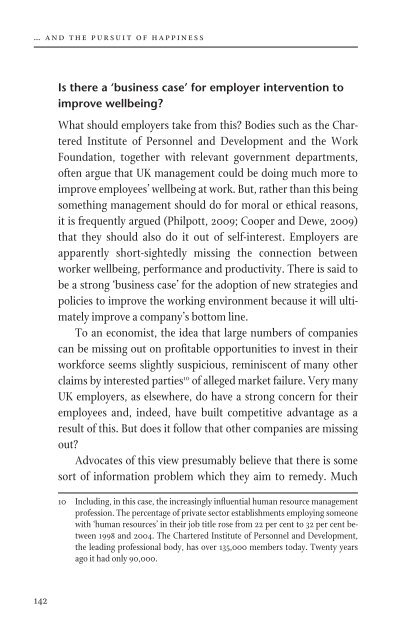… and the Pursuit of Happiness - Institute of Economic Affairs
… and the Pursuit of Happiness - Institute of Economic Affairs
… and the Pursuit of Happiness - Institute of Economic Affairs
Create successful ePaper yourself
Turn your PDF publications into a flip-book with our unique Google optimized e-Paper software.
<strong>…</strong> <strong>and</strong> <strong>the</strong> pursuit <strong>of</strong> happiness<br />
wellbeing at work: any lessons?<br />
Is <strong>the</strong>re a ‘business case’ for employer intervention to<br />
improve wellbeing?<br />
What should employers take from this? Bodies such as <strong>the</strong> Chartered<br />
<strong>Institute</strong> <strong>of</strong> Personnel <strong>and</strong> Development <strong>and</strong> <strong>the</strong> Work<br />
Foundation, toge<strong>the</strong>r with relevant government departments,<br />
<strong>of</strong>ten argue that UK management could be doing much more to<br />
improve employees’ wellbeing at work. But, ra<strong>the</strong>r than this being<br />
something management should do for moral or ethical reasons,<br />
it is frequently argued (Philpott, 2009; Cooper <strong>and</strong> Dewe, 2009)<br />
that <strong>the</strong>y should also do it out <strong>of</strong> self-interest. Employers are<br />
apparently short-sightedly missing <strong>the</strong> connection between<br />
worker wellbeing, performance <strong>and</strong> productivity. There is said to<br />
be a strong ‘business case’ for <strong>the</strong> adoption <strong>of</strong> new strategies <strong>and</strong><br />
policies to improve <strong>the</strong> working environment because it will ultimately<br />
improve a company’s bottom line.<br />
To an economist, <strong>the</strong> idea that large numbers <strong>of</strong> companies<br />
can be missing out on pr<strong>of</strong>itable opportunities to invest in <strong>the</strong>ir<br />
workforce seems slightly suspicious, reminiscent <strong>of</strong> many o<strong>the</strong>r<br />
claims by interested parties 10 <strong>of</strong> alleged market failure. Very many<br />
UK employers, as elsewhere, do have a strong concern for <strong>the</strong>ir<br />
employees <strong>and</strong>, indeed, have built competitive advantage as a<br />
result <strong>of</strong> this. But does it follow that o<strong>the</strong>r companies are missing<br />
out?<br />
Advocates <strong>of</strong> this view presumably believe that <strong>the</strong>re is some<br />
sort <strong>of</strong> information problem which <strong>the</strong>y aim to remedy. Much<br />
10 Including, in this case, <strong>the</strong> increasingly influential human resource management<br />
pr<strong>of</strong>ession. The percentage <strong>of</strong> private sector establishments employing someone<br />
with ‘human resources’ in <strong>the</strong>ir job title rose from 22 per cent to 32 per cent between<br />
1998 <strong>and</strong> 2004. The Chartered <strong>Institute</strong> <strong>of</strong> Personnel <strong>and</strong> Development,<br />
<strong>the</strong> leading pr<strong>of</strong>essional body, has over 135,000 members today. Twenty years<br />
ago it had only 90,000.<br />
use is made <strong>of</strong> case studies 11 which suggest that introducing new<br />
employee-friendly ways <strong>of</strong> working <strong>and</strong> engaging employees in<br />
managing <strong>the</strong>ir own jobs can lead to lower absenteeism, improved<br />
customer loyalty, higher productivity <strong>and</strong> better returns to<br />
investors.<br />
Interesting though such instances are, we should be wary <strong>of</strong><br />
case studies, which are essentially extended anecdotes. There are<br />
no proper controls: <strong>of</strong>ten <strong>the</strong> type <strong>of</strong> employer that is willing to<br />
introduce such workplace changes is one that already has a good<br />
reputation for <strong>the</strong> way it treats workers; consequently it attracts a<br />
lot <strong>of</strong> applicants <strong>and</strong> can pick <strong>and</strong> choose whom to employ. Therefore<br />
it has a positively minded workforce to begin with, one which<br />
is favourably disposed to innovation. In employee relations, as in<br />
o<strong>the</strong>r areas <strong>of</strong> business, <strong>the</strong>re is a ‘first mover’ effect: it does not<br />
follow that employers attempting to replicate <strong>the</strong> initiative with<br />
less amenable staff will be as successful. 12<br />
There have been o<strong>the</strong>r methodological approaches to building<br />
a case for employer interventions to improve wellbeing, including<br />
<strong>the</strong> use <strong>of</strong> laboratory-based experiments. For example, Oswald<br />
<strong>and</strong> colleagues conducted an experiment which demonstrated<br />
11 For instance, Robertson <strong>and</strong> Cooper in <strong>the</strong>ir recent volume (2011) present nine<br />
detailed studies <strong>of</strong> employer interventions to promote wellbeing. Athough each<br />
study has a section on ‘outcomes <strong>and</strong> evaluation’, however, it is notable that <strong>the</strong>se<br />
are all in qualitative terms. There is no quantification <strong>of</strong> <strong>the</strong> costs, which in some<br />
cases must have been substantial, or <strong>the</strong> benefits, <strong>and</strong> thus no demonstration<br />
that <strong>the</strong>se initiatives reduced costs or enhanced pr<strong>of</strong>itability.<br />
12 It is also worth bearing in mind <strong>the</strong> possible existence <strong>of</strong> a ‘Hawthorne effect’<br />
(named after a famous series <strong>of</strong> experiments with working practices at <strong>the</strong><br />
Hawthorne plant near Chicago before <strong>the</strong> war), whereby virtually any change to<br />
working conditions can induce an improvement in productivity because <strong>the</strong> individuals<br />
appreciate being singled out for special treatment. Once made routine,<br />
however, <strong>the</strong> new arrangements may have little permanent effect, particularly as<br />
new workers come in who were not part <strong>of</strong> <strong>the</strong> original innovation process.<br />
142 143












